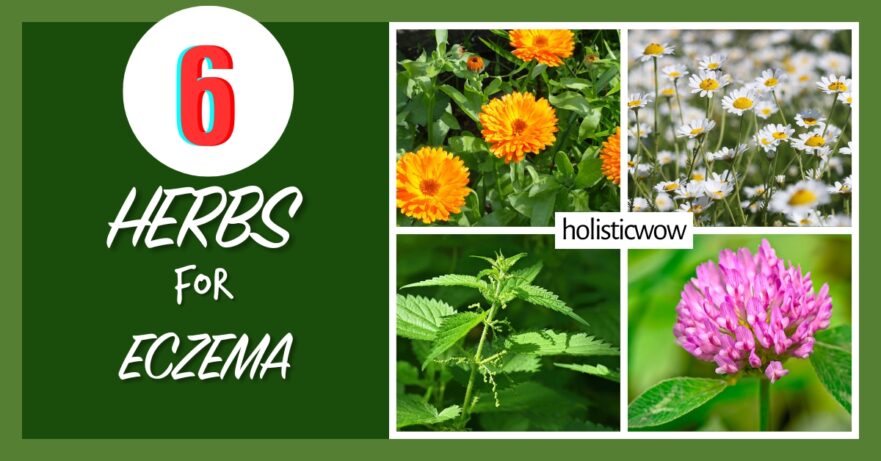In this article about herbs for eczema:
🌿 Best Herbs for Eczema | 📜 Herbal Preparations and Recipes for Eczema Relief | ☯️ Integrating Herbs into Daily Life for Eczema Relief | 🌱 Navigating Herbs Safely
Eczema is a chronic skin condition that causes inflammation, itching, and dry, scaly patches. It can be uncomfortable and impact the quality of life. Many people with eczema experience flare-ups that are difficult to manage with conventional treatments alone.
Certain herbs offer natural anti-inflammatory and soothing properties that may help relieve eczema symptoms. Calendula, chamomile, and nettle are among the herbs that have shown promise in reducing inflammation and supporting skin health for those with eczema.
We explore six herbs that may provide relief for eczema-prone skin. We’ll discuss their potential benefits, how to use them safely, and current research about their effectiveness for managing eczema symptoms.
Key Takeaways
- 🌿 Herb Effectiveness: Calendula, chamomile, and nettle are traditionally used for their anti-inflammatory and soothing properties, which may help alleviate eczema symptoms. However, the effectiveness can vary, and more research is needed to confirm this.
- 💦 Topical Applications: Herbal salves, compresses, and oils containing herbs like calendula, chamomile, and burdock may relieve inflammation, soothe irritated skin, and reduce itching, especially when used regularly.
- 💫 Internal Support: Herbal teas and infusions, while traditionally used for their anti-inflammatory effects, can support overall skin health but should complement rather than replace medical treatment for eczema.
- 🍵 Holistic Approach: Combining herbal remedies with lifestyle changes such as managing stress, maintaining a healthy diet, and using gentle skincare products can improve eczema management and enhance skin health.
🌿 Best Herbs for Eczema
Eczema, or atopic dermatitis, is a chronic skin condition that causes inflammation, redness, and itching. It affects both children and adults and leads to dry, scaly patches that can be extremely uncomfortable. Symptoms of eczema include intense itching, red or brownish-gray patches, small raised bumps, and thickened, cracked, or scaly skin. In severe cases, the affected areas may ooze or bleed.
The exact cause of eczema is not fully understood, but it’s believed to result from a combination of genetic and environmental factors. Research suggests that people with eczema often have an overactive immune system that responds to irritants or allergens by producing inflammation. Common triggers include certain fabrics, soaps, stress, and changes in temperature or humidity.
Several herbs have been traditionally used to help manage eczema symptoms, including calendula (Calendula officinalis), chamomile (Matricaria chamomilla), nettle (Urtica dioica), red clover (Trifolium pratense), cleavers (Galium aparine), and burdock (Arctium lappa). These herbs are known for their potentially anti-inflammatory and soothing properties, which may help alleviate some of the discomfort associated with eczema when used topically or as part of a holistic approach.
Calendula (Calendula officinalis)
Calendula (Calendula officinalis) has been used for centuries to treat various skin conditions, including eczema. This herb contains flavonoids and triterpenoids that contribute to its anti-inflammatory and wound-healing properties. Calendula’s anti-inflammatory and antioxidant actions may help soothe irritated skin and support the skin’s natural healing process. Studies suggest that Calendula’s wound-healing properties may support recovery from eczema by promoting tissue regeneration and reducing inflammation [1] [2]. Calendula is commonly found in creams and ointments for topical use. While some clinical evidence supports calendula’s effectiveness in treating eczema and improving wound healing, larger, more rigorous trials are needed to confirm its benefits fully. Despite this, calendula remains a popular option for soothing irritated skin in eczema due to its historical use and promising research.
Chamomile (Matricaria chamomilla)
Chamomile (Matricaria chamomilla) is a widely known herb used for centuries to address various health issues, including skin conditions like eczema. Chamomile contains key compounds, such as chamazulene and bisabolol, which are well-documented for their anti-inflammatory and soothing effects. These properties can help reduce skin irritation, redness, and dryness, which are common in eczema flare-ups. Chamomile also exhibits antimicrobial properties, which may help prevent secondary infections often associated with eczema [3] [4]. Chamomile can be applied in various forms, including creams, ointments, or as a cool compress made from chamomile tea. While chamomile is generally safe, individuals allergic to plants in the Asteraceae family, such as ragweed, should exercise caution, as they may experience allergic reactions.
Nettle (Urtica dioica)
Nettle (Urtica dioica) has been used traditionally to support skin health, including conditions like eczema. Topically, nettle is often used in creams or ointments, and while some people report benefits like reduced itching and inflammation, scientific evidence for its direct effectiveness on eczema is limited. A study assessing nettle’s antibacterial activity found no strong evidence of antimicrobial properties. However, traditional preparations involving nettle, such as those combined with vinegar or oils, may still help soothe skin by acting as carriers for moisturizing and protective ingredients [5]. While nettle’s specific impact on eczema is still being researched, its anti-inflammatory properties are well-documented and may contribute to skin health when combined with other ingredients [6]. Further research will help uncover its full potential in skin care.
Red clover (Trifolium pratense)
Red clover (Trifolium pratense) has been traditionally used to support skin health and treat conditions like eczema and psoriasis. Due to compounds like phenolic acids and flavonoids, its anti-inflammatory and antioxidant properties may promote skin rejuvenation and general wellness. Red clover also contains isoflavones, which have estrogen-like effects and may help maintain hormonal balance and support skin health, though research specifically on eczema is still limited [7]. Traditionally, red clover has been used in topical creams or ointments and taken internally as a tea to promote detoxification and circulatory health, possibly contributing to healthier skin. However, its effectiveness for eczema specifically remains anecdotal, and more research is needed to confirm these benefits. Red clover is generally safe, but it should be used with caution by individuals with hormone-sensitive conditions or those on blood thinners.
Cleavers (Galium aparine)
Cleavers (Galium aparine) has been traditionally used to support skin health and treat conditions like eczema. It is believed to have diuretic and lymphatic-stimulating properties, which may aid in detoxifying the body and supporting overall skin wellness. These effects and its anti-inflammatory properties may help reduce skin irritation and inflammation associated with eczema. Traditionally, Cleavers are used both internally as a tea or tincture to promote the body’s natural detoxification processes and topically in creams or ointments to soothe irritated skin. However, most evidence supporting its use for eczema remains anecdotal, and more research is needed to confirm its effectiveness.
Burdock (Arctium lappa)
Burdock (Arctium lappa) has long been used in traditional medicine to treat skin conditions, including eczema. Its anti-inflammatory and antioxidant properties may help reduce skin inflammation and protect against oxidative stress. Burdock is also believed to support skin health by promoting liver detoxification, which can aid in managing skin conditions by helping the body clear toxins [8]. In addition to these detoxifying effects, burdock contains inulin, a prebiotic fiber that supports gut health, which may indirectly benefit the skin. Burdock can be consumed as a tea or supplement to support overall skin health. When applied topically in creams or ointments, it can help soothe irritated skin and promote healing. While generally safe, burdock may interact with blood thinners and diuretics, and pregnant women should avoid it due to its potential effects on uterine stimulation.
📜 Herbal Preparations and Recipes for Eczema Relief
These herbal recipes are designed to help manage eczema symptoms using the beneficial properties of herbs known for their skin-soothing effects. Each blend supports skin health through natural remedies. However, while many of these herbs have a long history of use in traditional medicine, some claims are based on anecdotal evidence, and more research is needed to confirm their efficacy for eczema.
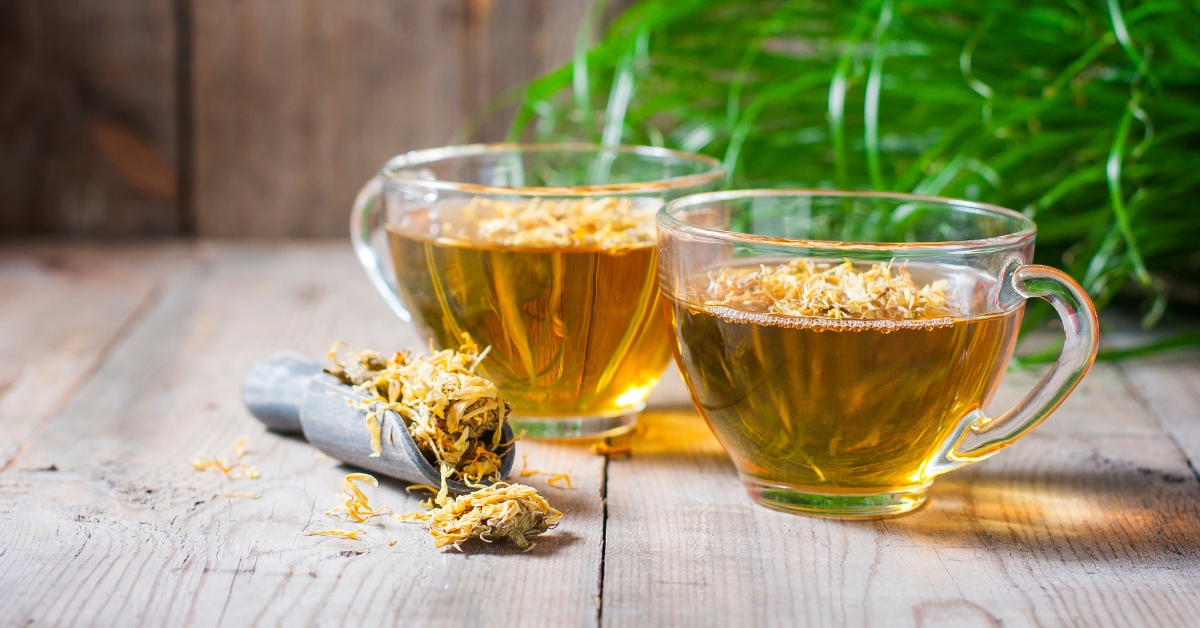
Soothing Chamomile-Calendula Tea
Ingredients:
- 1 teaspoon dried chamomile flowers
- 1 teaspoon dried calendula petals
- 1 cup of boiling water
Preparation:
- Combine the dried herbs in a teapot.
- Add 1 cup of boiling water and steep for 10 minutes.
- Strain and drink once daily to help reduce inflammation and support general skin health.
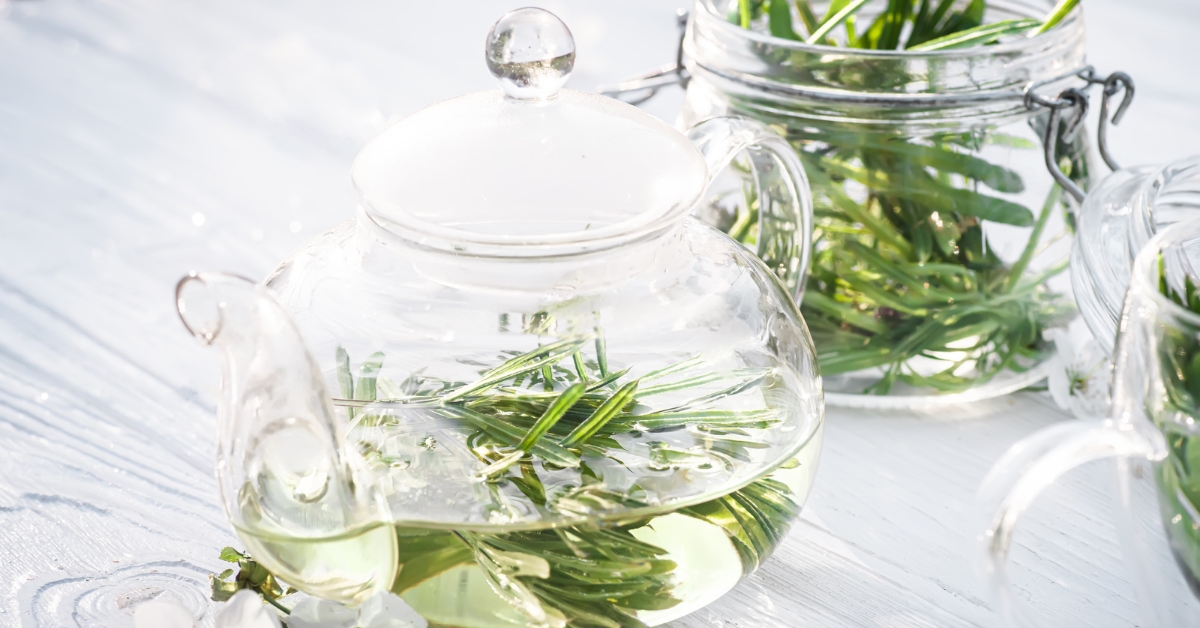
Nettle-Cleavers Infusion
Ingredients:
- 1 teaspoon dried nettle leaves
- 1 teaspoon dried cleavers
- 1 cup of boiling water
Preparation:
- Mix the herbs in a teapot.
- Pour boiling water over the herbs and steep for 15 minutes.
- Strain and drink twice daily to support detoxification and help reduce inflammation.
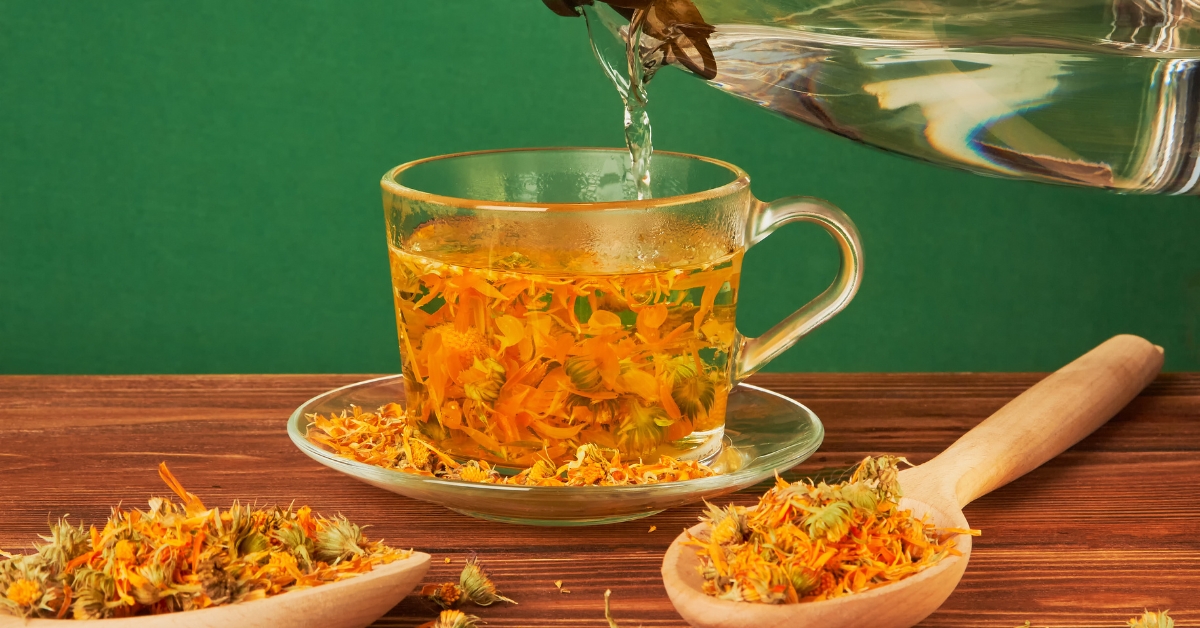
Calendula-Chamomile-Red Clover Compress
Ingredients:
- 1 teaspoon dried calendula petals
- 1 teaspoon dried chamomile flowers
- 1 teaspoon dried red clover blossoms
- 2 cups of boiling water
Preparation:
- Steep the herbs in boiling water for 15 minutes.
- Strain and let cool until comfortably warm.
- Soak a clean cloth in the infusion and apply as a compress to affected areas for 15-20 minutes, 2-3 times daily.
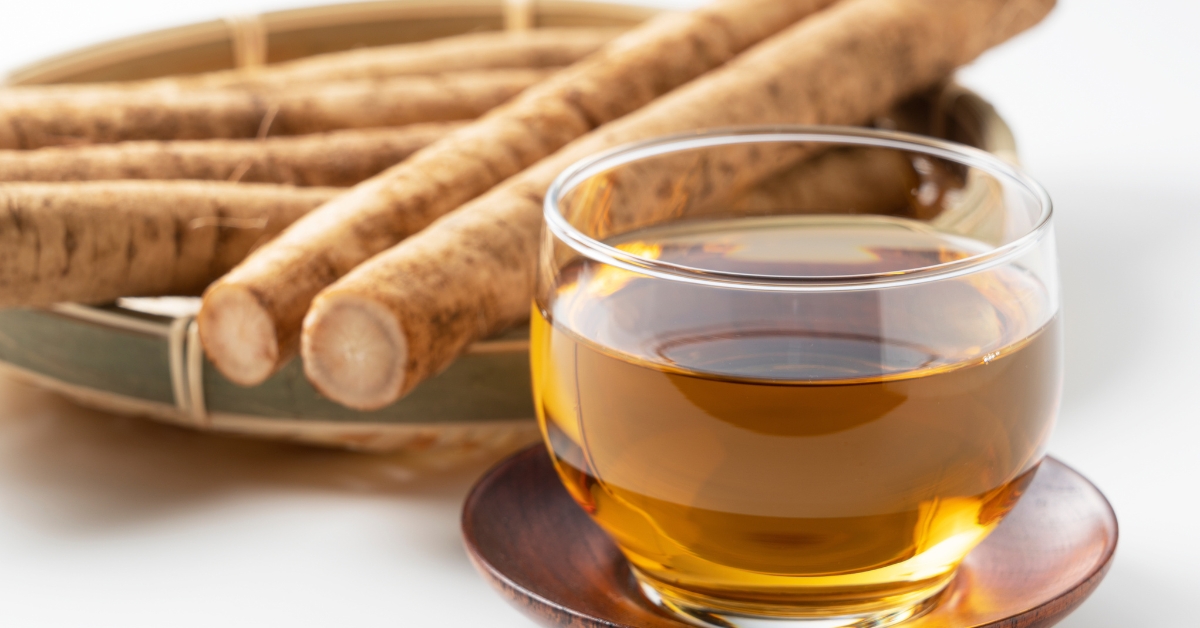
Burdock-Nettle-Red Clover Tea
Ingredients:
- 1 teaspoon dried burdock root
- ½ teaspoon dried nettle leaves
- ½ teaspoon dried red clover blossoms
- ½ teaspoon dried cleavers
- 1 cup of boiling water
Preparation:
- Combine all herbs in a teapot, add boiling water, and steep for 15-20 minutes.
- Strain and drink once daily to support skin health.
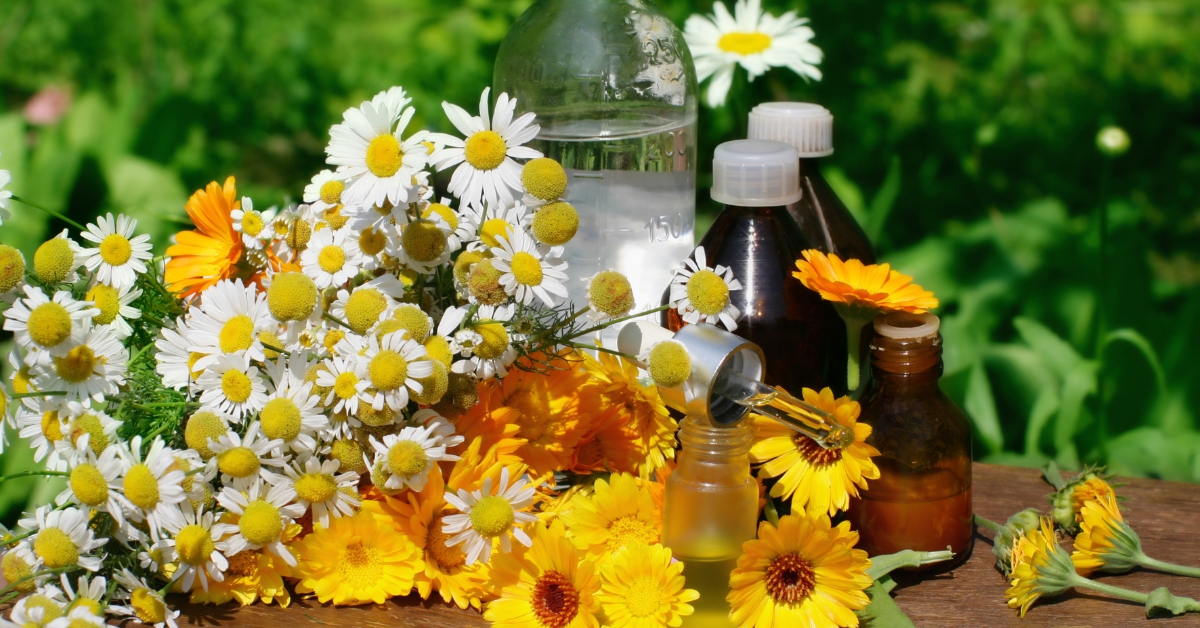
Intensive Eczema Relief Salve
Ingredients:
- 2 tablespoons dried calendula petals
- 2 tablespoons dried chamomile flowers
- 1 tablespoon dried nettle leaves
- 1 tablespoon dried red clover blossoms
- 1 cup olive oil or coconut oil
- ¼ cup beeswax pellets
Preparation:
- Infuse the herbs in the oil using a double boiler for 2-3 hours on low heat.
- Strain the herbs and return the infused oil to the double boiler.
- Add beeswax and stir until melted. Pour into clean jars and let cool.
- Apply to affected areas 2-3 times daily for soothing relief.
Always perform a patch test before using new topical treatments and consult a healthcare provider before starting any new herbal regimen, especially if you have existing health conditions or are taking medications.
☯️ Integrating Herbs into Daily Life for Eczema Relief
Incorporating herbs into your daily routine can help manage eczema symptoms and support overall skin health. Here are practical tips for using herbs effectively and complementary practices to maximize their benefits.
Daily Use and Lifestyle Integration
- 🫖 Herbal Teas: Start your day with a cup of Soothing Chamomile-Calendula Tea or Nettle-Cleavers Infusion. These can help reduce inflammation and support detoxification from within. Consider drinking these teas 1-2 times daily, but monitor your body’s response.
- 🫧 Topical Applications: Apply the Intensive Eczema Relief Salve to affected areas 2-3 times daily, especially after bathing when the skin is still damp. This can help lock in moisture and provide soothing relief throughout the day.
- 💚 Herbal Compresses: Use the Calendula-Chamomile-Red Clover Compress on particularly irritated areas for 15-20 minutes, 2-3 times daily. This can be especially helpful before bed to reduce nighttime itching and promote better sleep.
Additional Practices to Support Skin Health
- 🥦 Dietary Adjustments: Incorporate anti-inflammatory foods into your diet, such as omega-3-rich fish, leafy greens, and turmeric. These can complement the effects of herbal treatments by reducing overall inflammation.
- 🫶 Gentle Skincare Routine: Use mild, fragrance-free cleansers and moisturizers. After bathing, pat the skin dry gently and apply moisturizer immediately to lock in hydration. While coconut oil is moisturizing, it can be irritating for some individuals with eczema. Start with a patch test before the full application.
- 🧘♀️ Stress Management: Practice stress-reduction techniques like deep breathing, meditation, or gentle yoga. Stress can worsen eczema symptoms, so managing stress is important for overall skin health.
- 💥 Avoid Triggers: Identify and avoid personal eczema triggers, which may include certain fabrics, soaps, or environmental factors. Keeping a journal can help track potential triggers and the effectiveness of herbal treatments.
- 🫗 Hydration: Drink plenty of water throughout the day to support overall skin health. Herbal teas can contribute to your daily fluid intake while providing additional benefits.
- 👚 Clothing Choices: Opt for loose-fitting, breathable clothing made from natural fibers like cotton. This can help reduce skin irritation and allow your skin to breathe.
- 🏃♀️ Regular Exercise: Regular, moderate exercise supports overall health and reduces stress. Be mindful of sweat-induced irritation and rinse off promptly after workouts.
When integrating these herbs and practices into your daily life, start with small amounts to see how your body reacts. It’s important to be consistent with your herbal regimen while being patient, as natural remedies may take time to show their full effects. These herbal approaches can complement conventional medical treatments for eczema.
🌱 Navigating Herbs Safely
Starting with small doses is the first step when adding herbal remedies to your health routine. This approach lets you see how you respond and adjust amounts for the best effect, keeping safety in mind. While many herbs are safe, everyone’s body reacts differently. If you notice any side effects, it’s important to stop and think about what might be causing them.
Remember, herbs can sometimes interact with prescription medicines. These interactions might make your medicines work too well or not well enough, which is why talking to a healthcare provider or an herbalist is essential. This is especially crucial if you’re pregnant, breastfeeding, taking medications regularly, or have an existing health condition. Getting advice tailored to your situation can help you avoid any unnecessary risks.
For kids and older adults, being extra careful with herbs is important. Their bodies might react more strongly to herbal remedies, and the chance of side effects or interactions could be greater. Before giving herbal treatments to children or elderly family members, getting advice from a professional is a must to ensure their safety.
By being cautious and seeking expert advice when needed, you can make herbal remedies a safe part of your wellness plan. This careful approach allows you to enjoy the benefits of herbs while keeping yourself and your family safe.
We discussed key herbs including calendula, chamomile, nettle, red clover, cleavers, and burdock. Each herb offers unique benefits for skin health and eczema relief. Herbal recipes and preparations, such as teas, infusions, compresses, and salves, can be easily incorporated into daily routines. These remedies aim to reduce inflammation, soothe irritated skin, and support overall internal and external skin health.
While there are potential benefits to these natural remedies, it’s important to consult with healthcare providers before starting any new herbal regimen, especially for those with existing health conditions or taking medications.
FAQ
Which herbs are most effective for treating eczema symptoms?
Several herbs have shown potential in alleviating eczema symptoms, though the strength of clinical evidence varies. Calendula is widely recognized for its anti-inflammatory and wound-healing properties, making it a common ingredient in creams for soothing irritated skin and reducing inflammation. Chamomile, known for its calming effects, may help reduce skin irritation and improve the skin's barrier function due to its anti-inflammatory and antioxidant compounds. However, most research has focused on animal models rather than humans. With its anti-inflammatory and possible antihistamine-like properties, nettle is traditionally used to reduce inflammation. While its antihistamine effects are more established for conditions like allergic rhinitis, it still holds promise for soothing skin conditions like eczema. Red clover contains isoflavones with potential anti-inflammatory effects, though research has mainly explored its benefits for menopausal symptoms. Burdock has long been used as a detoxifying herb, believed to purify the blood and support skin health. Its anti-inflammatory and antioxidant properties may assist in managing inflammatory skin conditions, but more specific studies on its effectiveness for eczema are needed. Although these herbs have been used traditionally for managing skin issues, including eczema, their efficacy can vary from person to person. More research is needed to fully establish their effectiveness in treating eczema. They remain popular options in traditional medicine and may serve as helpful complements to conventional treatments.
How can I safely use herbal remedies for eczema at home?
Herbal remedies for eczema can be used safely and with proper precautions. Herbal teas and infusions made with herbs like chamomile, calendula, or nettle may support overall skin health due to their anti-inflammatory properties. However, scientific evidence for their internal use, specifically for eczema, is limited. These teas can also be cooled and used as compresses on affected areas to soothe irritated skin. While chamomile and calendula are well-documented for topical use, more caution is needed with nettle, as its effectiveness for eczema is primarily anecdotal. For topical use, creating herbal-infused oils or salves can be beneficial. To make these, infuse dried herbs in a carrier oil such as olive or coconut oil for 1-2 weeks, then strain the oil. If desired, combine the infused oil with beeswax to make a salve. Be sure to perform a patch test before applying any new herbal preparation to check for potential allergic reactions, especially with sensitive skin conditions like eczema. Patch testing is critical as some individuals may be allergic to herbs like chamomile, especially if they have a ragweed allergy. It’s crucial to use high-quality, organic herbs to avoid contaminants like pesticides or heavy metals, which could exacerbate skin issues. When making topical preparations, ensure all tools and containers are thoroughly sanitized to prevent bacterial contamination. Improper handling can introduce infections, particularly in skin compromised by eczema. Remember that herbal remedies should complement, not replace, conventional treatments. They are supportive, but eczema often requires targeted medical interventions. Consulting with a healthcare provider before starting any new herbal regimen is important, particularly if you have pre-existing health conditions or are taking medications, as certain herbs can interact with common treatments.
Are there any potential side effects or interactions when using herbs for eczema?
While herbs can be beneficial for managing eczema symptoms, it's important to be aware of potential side effects and interactions. Some individuals may experience allergic reactions to certain herbs, especially if they have existing allergies to plants in the same family. For example, those with ragweed allergies may react to chamomile. Additionally, calendula and other members of the Asteraceae family may cause skin irritation or contact dermatitis in sensitive individuals, particularly when applied topically. In cases of sensitive skin, patch testing is strongly recommended before using any new herbal remedy. When taken internally, some herbs may interact with medications. For instance, burdocks may interact with blood thinners like warfarin or diuretics, and nettles could potentially affect blood pressure medications due to their diuretic properties. Pregnant women should be particularly cautious with herbal remedies, as some herbs may stimulate uterine contractions. Red clover also contains phytoestrogens, which could interfere with hormonal treatments. It's also worth noting that the long-term effects of some herbal treatments are not well-studied. For example, while many herbs have been used traditionally, there is limited clinical data on their long-term safety, particularly when used in combination with prescription medications. To minimize risks, it’s important to start with small amounts of any new herbal remedy and monitor your body’s response. Always inform your healthcare provider about any herbal treatments you're using, especially if you're taking prescription medications or have underlying health conditions. This will help ensure that your overall treatment plan is safe and effective.

